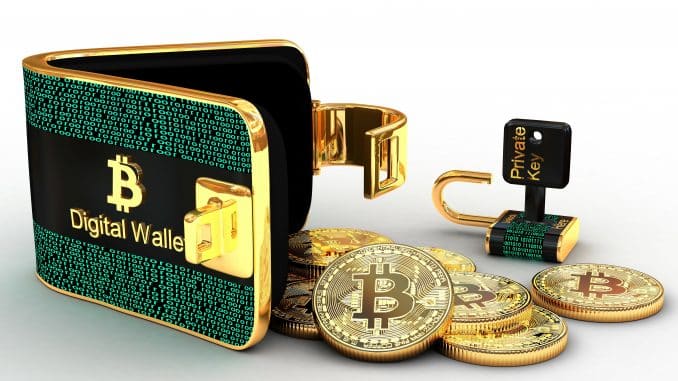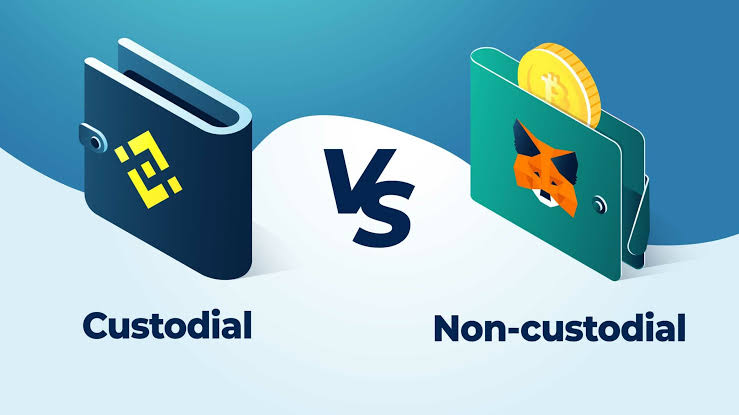Are you struggling to pick what type of crypto wallet to use, and feeling overwhelmed by the sheer volume of information out there? You’re not alone.
Millions of people are caught in the crypto frenzy, but with so many exchanges and wallet providers to choose from, it’s easy to feel lost in a sea of options. The question is, how do you pick the best one for your needs?
In this article, I’ll break down everything you need to know about custodial and non-custodial wallets, their pros and cons, and help you make an informed decision. Get ready to discover the ultimate guide to choosing the perfect crypto wallet for you!
What Is a Custodial Crypto Wallet?

What Is a Custodial Wallet?
A custodial wallet is a crypto wallet service offered by a centralised business such as a crypto exchange. The cool thing about custodial wallets is that you don’t have to worry as much about managing your private keys, which is usually a big responsibility. When you outsource wallet custody to a business, you’re basically handing over your private keys to them and trusting them to keep them safe.
Sending coins out of a custodial wallet is a breeze – just log in with your username and password, pop in the public key of where you wanna send your coins, and voila! The business will take care of the private key part to complete the transaction. It’s as simple as that.
But here’s the catch – with this simplicity comes an extra layer of risk. Many exchanges have been hacked in the past, like Mt. Gox, QuadrigaCX, BTC-e, and Bitstamp, so you must be careful.
Advantages of Custodial Wallets
1. Convenient and Easy To Use:
Custodial wallets are a great option for beginners who are just getting started with cryptocurrencies, as they do not require extensive knowledge of blockchain technology to use them. This means that you can easily buy, store, and sell crypto without having to understand the complexities of the underlying technology. Instead, you can rely on the service provider to manage the technical details of the wallet, such as security, backups, or maintenance.
2. Customer support:
One of the benefits of using custodial wallets is that they typically offer customer support services to their users. Since custodial wallets are managed by a third-party service provider, they have dedicated customer support teams that can assist you with any issues or problems you may encounter while using the wallet.
If you experience any issues with your wallet, such as difficulty logging in, trouble sending or receiving cryptocurrency or concerns about security, you can reach out to the wallet provider’s customer support team for assistance. This can be particularly helpful if you are a beginner in the world of crypto and may need guidance or support with using your crypto wallet.
3. Higher security measures:
These wallets are usually backed by larger companies with more resources to apply suitable security measures, like two-factor authentication and other security protocols to protect your funds.
With a custodial wallet, you do not have to worry about managing your own security measures, as the service provider takes care of this on your behalf. The service provider will usually implement a range of security measures to protect your wallet and funds, including measures to prevent hacking attempts, malware attacks, and other types of security breaches.
4. Recoverability of funds:
In case of loss of private keys or other issues, custodial wallets usually have processes in place to help you recover your funds in case any issue occurs. Since custodial wallets are managed by a third-party service provider, you do not have to worry about managing your private keys, as this is also taken care of by the service provider on your behalf.
If you lose access to your crypto wallet, you can contact the wallet provider’s customer support team for assistance with recovering your funds. The service provider will typically have a process in place to verify your identity and ensure that you are the rightful owner of the funds before taking steps to recover the funds and restore access to the wallet.
Disadvantages of Custodial Wallets
1. Loss of control over funds:
Custodial wallets require users to trust third-party companies with their funds, meaning they lose control over their cryptocurrencies.
With a custodial wallet, you are entrusting your funds to that company and renouncing control over them. If the company experiences a security breach or goes bankrupt, your funds could be at risk.
2. Risk of hacks and theft:
Over the years, we have heard and even experienced cases of exchange hacks and scams, which have left millions of people distraught. This often happens when the wallet provider’s security measures are not strong enough, and since custodial wallets are connected to the internet, they are vulnerable to cyber-attacks.
As mentioned earlier, you do not have complete control over your private keys, and the responsibility of keeping them secure lies with the wallet provider. If the provider’s security measures are inadequate, it can lead to significant financial losses.
3. Fees:
Most custodial wallets charge certain transaction fees, such as deposit, withdrawal, and monthly fees. These wallet providers charge for their services, and you may not get the most out of your investment because of these various charges, which accumulate over time.
4. A limited selection of cryptocurrencies:
With Custodial wallets, most are limited in the types of cryptocurrencies they support. I’ve even encountered an exchange that only supports Bitcoin, so what if you want to store or trade Ethereum? The lack of other crypto coins could limit your investment options.
What Is a Non-Custodial Crypto Wallet?

What is a Non-Custodial Wallet
A non-custodial wallet is a type of Blockchain wallet that lets you be your own bank. This means you have total control over your funds and the associated private key.
The idea behind non-custodial wallets is pretty simple – you’re the boss of your private keys. The wallet provider has no access to your keys, so they can’t freeze your assets or control them in any way.
Non-custodial wallets generate a unique private key that no one can access but you. This private key is used to sign and verify transactions on the blockchain network. You can use your non-custodial wallet through a software application or a web-based interface, and you can view your balance, send and receive crypto, and even manage your wallet settings.
This wallet is often considered more secure than custodial wallets, as they give users more control over their funds and reduce the risk of hacks or theft by hackers and third parties. However, the responsibility of keeping your wallet safe falls on your shoulders.
Advantages of Non-Custodial Wallets
1. Total Control Over Funds:
Non-custodial wallets give you complete control over your cryptocurrencies and private keys, which means they are not reliant on third-party companies. This control allows you to manage your funds as you see fit, such as transferring, storing, or trading them without restrictions or limitations.
2. Increased Security:
Since non-custodial wallets are not managed by a third party, you are responsible for your security and can take measures to protect your funds. You can use advanced security measures, such as multi-factor authentication, strong passwords, and hardware wallets, to secure your private keys and keep your funds safe from potential hacks or breaches.
3. Privacy:
Non-custodial wallets provide you with greater privacy, as you do not need to provide personal information to a third-party company. This anonymity helps you maintain your financial privacy, and it prevents potential data breaches from exposing sensitive personal information.
4. Greater Selection of Cryptocurrencies:
Non-custodial wallets may support a broader range of cryptocurrencies, providing users with more investment options. This diversity enables users to invest in various cryptocurrencies and diversify their portfolios to reduce risk.
Disadvantages of Non-Custodial Wallets
1. Greater responsibility:
With a non-custodial wallet, you are required to take responsibility for your security and back up your private keys, which can be quite difficult. This responsibility can be overwhelming, especially if you are a crypto newbie, and any mistake or oversight can result in the loss of funds.
2. A lost key equals lost money.
I know everyone prays against this, but there’s still a possibility of it happening, c’mon we’ve all heard stories of crypto millionaires who lost their fortunes due to the loss of private keys.
When you lose the key to your wallet, it basically means that you have lost your funds and assets. And unfortunately, there is no other option to get the money back.
Comparison between Custodial and Non-Custodial Crypto Wallets:
1. Custodian of the private key:
In a custodian wallet, people give up the control of their key to a third party in exchange for access to a password. If this password is lost or forgotten, you can recover it.
But if you use a non-custodial wallet, there is no option for you to retrieve it when your private key is lost.
2. Real-time transaction:
When you make transactions with a custodian wallet, it does not show on the chain in real time. Additionally, permission from a central authority is needed before any transactions occur. This is not the case with a non-custodial wallet, so it has the upper hand here.
3. Security:
There is a higher level of security regarding the non-custodial wallet because the private key and your data remain intact unless the key is lost or stolen.
But for custodian wallets, your keys and data are stored in servers globally, and this results in breaches and attempts of hacking. There have been numerous instances of the same, and unless strong security measures are implemented, it will likely keep happening.
4. Backup and recovery possibility:
Custodial wallets keep the key in their possession. So, even if you lose data entry, you can reclaim access by contacting a third party.
But, this is not attainable in the case of Non-Custodial wallets because you are the sole authority.
5. Offline accessibility:
One has to log into your Custodial wallet to access funding and related details. Thus it is necessary to have internet connectivity.
But, there is no such provision in Non-Custodial wallets. Thus Non-Custodial wallets are a more suitable option for experiencing a complete blockchain development environment in real time.
Custodial vs Non-Custodial Wallets: Which Should You Pick?

Custodial vs Non-Custodial Wallets: Which Should You Pick?
We have analysed what custodial and non-custodial wallets are, their merits and demerits, so you might already have an idea of which type of wallet you’re leaning towards. You may still be confused but don’t worry too much.
When choosing whether to use a custodial or non-custodial wallet, you must know that there is no right or wrong option.
So, how do you pick which to use? It all depends on your financial goals, needs and your capabilities. If you are a beginner, you should start with a custodial wallet, and then as you become more experienced, you can venture into a non-custodial one.
But this doesn’t mean that only beginners use custodial crypto wallets. In fact, you might be shocked to find out that many OG’s and experts still use this type of wallet but also have non-custodial ones.
Ultimately, it all depends on you, what you want, and the risks you are willing to take.
Conclusion
In conclusion, choosing between a custodial or non-custodial crypto wallet depends on your preferences and needs. Custodial wallets may offer convenience and additional services but come with a higher level of risk and less control over your assets.
On the other hand, non-custodial wallets provide greater security and control but may require more effort and responsibility on your part.
Educate yourself on best practices for securing your wallet, such as using strong passwords, enabling two-factor authentication, and keeping your private keys safe.
So, if you haven’t already, it’s time to take action and choose the right crypto wallet for you. Regardless of the wallet you choose, it’s crucial to prioritise safety, security, and control over your assets. With the proper knowledge and the right crypto wallet for you, you will be well on your way to becoming a successful crypto trader. Good luck!
